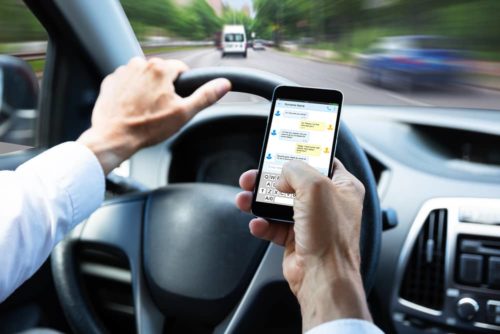Texting While Driving: What Is Against the Law in Florida?
Texting while driving became a primary offense under Florida law on January 1, 2020. The new law bans not only texting but also any other form of typing on a mobile device, such as emailing, note-taking or any other form of manually tapping the keys of your mobile phone to send or respond to a message while your vehicle is in motion and you are behind the wheel. That means it can now be grounds for a police officer to pull you over and issue a citation solely based on the fact that you were texting and driving. This is a radical change from the way that texting used to be treated under Florida law, when a police officer could not pull over a motorist solely for texting while driving and one of few states that took this approach. This made little sense for a state in which, in 2016, there were 50,000 accidents and 233 deaths where texting was the primary factor. This was noted by Florida Governor Ron DeSantis when he signed the measure into law shortly prior to its first part becoming effective on July 1, 2019, which involved bans on texting and related types of mobile phone use in construction and school zones.
Texting while driving is a major issue in Florida and has been for quite some time. The state already has some of the most dangerous roads of any state in the country and the fact that Florida was among a small minority of states that did not previously have a law making texting a primary offense likely contributed to Florida’s status as a state with one of the highest proportion of motor vehicle accidents that involve death or serious injuries. Nevertheless, even with the passage of this new law, our experienced personal injury attorneys at Schwed, Adams & McGinley have seen the consequences of distracted driving caused by someone texting while they are driving in the cases we have handled on behalf of our clients. Taking your eyes off the road for even a split second to read or send a text message or an email is a terrible idea and can result in death or serious injury for someone whose sole mistake was to be driving nearby.
How Was Texting While Driving Previously Treated in Florida?
Prior to the new law’s broader provisions prohibiting texting while driving taking effect in January of this year, texting used to be a secondary offense under Florida law, meaning that a driver could only be pulled over for it if the driver committed some other infraction or moving violation that gave the police officer a reason to pull you over. Thus, you may have been egregiously texting and not paying attention to the road but, if a police officer could not find some other reason to pull you over, then the officer could only look on helplessly as you endangered other motorists and yourself by texting or sending an email on your phone if you did not also commit some other offense that would have permitted the police officer to pull you over, for example, driving with an expired tag.
Florida Begins to Take Texting While Driving Seriously
The new law had a short grace period of six months after its July 1, 2019, effective date during which it was only against the law to text in construction zones or schools and, even then, police only issued warnings if they spotted a driver in violation. Now, however, the law is fully operational and police can pull over anyone they suspect of texting while driving.
In terms of penalties, first-time offenders under the new law face a $30 fine for a violation, while a second violation within five years of the first violation leads to a $60 fine in addition to three driver’s license points on the individual’s driving record. To avoid the fine, first-time offenders may provide proof of purchase of a hands-free bluetooth device and complete a driver’s safety education course after being cited for texting and driving.
What Is Permitted Under the New Law?
The new law has led to some confusion as to what exactly drivers are permitted to do behind the wheel as it relates to their mobile phones. For example, while using your mobile phone to text or email someone while the car is in motion is prohibited, the following are some examples of actions that are not prohibited under the new law:
- Drivers can answer the phone manually if someone calls them.
- Holding the phone manually to talk on the phone.
- Texting at a stoplight or while the car is not moving is also not prohibited. Instead, the car must be in motion for a driver to be in violation of the new law.
- Using Google Maps, Waze or another mapping or navigation app and typing an address into the app while the vehicle is in motion is allowed.
- A driver can read emergency messages such as weather alerts, except in school and construction zones.
Contact Schwed, Adams & McGinley
At Schwed Adams & McGinley, P.A., our experienced personal injury attorneys have more than 150 years of combined legal experience and many of our firm’s cases stem from motor vehicle accidents in which our clients have suffered catastrophic injuries or have been the victim of a wrongful death where someone was texting while driving. We applaud the State of Florida’s actions in finally addressing the issue of texting while driving, which we knew to be a problem long before this law was passed. No matter the type of accident or scenario, contact our experienced attorneys at contact@schwedlawfirm.com or (877) 694-6079 for a free consultation today if you have been injured or a loved one has been killed or injured in a motor vehicle accident in Florida.





